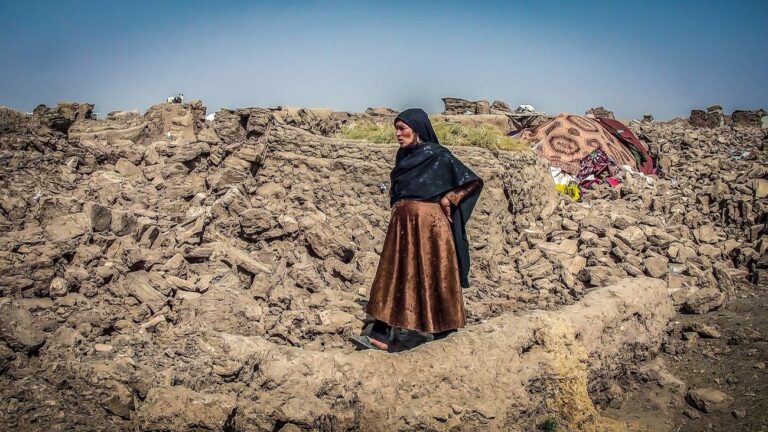Afghanistan earthquake survivors tell their stories
.jpeg?auto=webp)
Dust, rain and a storm that sounded like thunder
Afghanistan earthquake survivors tell their stories
In October, western Afghanistan was devastated by massive earthquakes, which took more than 1,400 lives, flattened whole villages and devastated livelihoods. Around 2.2 million people are in need, and families are grappling with unimaginable loss and trauma. Here are three survivors’ stories.
“If I had my daughter now, I would have my world with me.”
Dawood was enjoying a peaceful morning with his family in the quiet village of Naeb Rafi. He had no idea that his life was about to change forever.
The earthquake brought dust, rain and storm that sounded like thunder. “We tried to run out of the house, but it collapsed behind us, trapping us under the debris,” he said.
He lay there trapped, unable to move for hours. He could hear his 3-year-old daughter crying for help, but he couldn’t reach her.
Dawood was finally rescued by his neighbours, but the worst was yet to come. He learned that his brother and his other daughter had died.
.jpg?auto=webp)
.jpeg?auto=webp)
Photo: Shutterstock/Waheedullah Jahesh
Dawood’s life was changed forever in October 2023 when a series of powerful earthquakes struck Herat Province in western Afghanistan. Photos: Shutterstock/Waheedullah Jahesh (left) and UNDP Afghanistan (right)
He was taken to a tent, where he found his surviving daughter, while his wife had been taken to hospital. His daughter, Zahra, as well as his brother, Karzai, 11, were among the casualties.
Dawood had lost everything. “If I had my daughter now, I would have my world with me,” he said.
The ache of not being able to save his daughter during the chaos, the inability to see her for the last time, adds layers of grief to an already heart-wrenching tale.
Mahzada
“Our hearts were scared and trembling.”
The village of Naeb Rafi is surrounded by a vast desert that holds the stories of its people. Life here was simple for Mahzada and her close-knit family.
She was preparing food when the earth shook. Rushing outside, she found chaos. Walls crumbled. Her mother-in-law was killed when the house fell on her.
At night, the community found themselves in darkness, without lights or homes.
.jpeg?auto=webp)
.jpeg?auto=webp)
Photo: UNDP Afghanistan
Mahzada worries about how she will feed her family and keep them warm through the harsh winter. Family members were killed, homes had collapsed, and sources of water, food, light and heat had disappeared. Photos: UNDP Afghanistan
“From night until the morning, our hearts were scared and trembling,” Mahzada said, remembering the fear that another earthquake would come.
“Our children are hungry and thirsty, there is nothing in our hands. We have nothing to give to our children. Our lives were good, but now, as you can see, all this destruction has made us of nowhere. We need a house in the winter so that the children can be cared for, the wounded can heal, and we can remain alive.”
“Twenty-seven members of my family perished, and we lost everything we had.”
Cultural norms and restricted social mobility play a part in who is most likely to be affected by earthquakes in Afghanistan. Women and children suffer most because they are usually the ones at home.
.jpeg?auto=webp)
.jpeg?auto=webp)
.jpeg?auto=webp)
Raiza Gul lost 27 members of her family. Most of the earthquake victims were women and children who were in their homes when they collapsed. Photos: UNDP Afghanistan
Raiza Gul and her extended family were gathered for their morning green tea on that tragic day. She survived only because she happened to step outside to check on her sheep the moment the earthquake struck.
“It got dark and dusty everywhere. Then things got clear; I saw that my sister-in-law with her son and daughter were under debris up to their shoulders. Her son’s nose was running blood, and he was dead.”
https://cdn.embedly.com/widgets/media.html?src=https%3A%2F%2Fwww.youtube.com%2Fembed%2FLYY5W94dBwE%3Ffeature%3Doembed&display_name=YouTube&url=https%3A%2F%2Fwww.youtube.com%2Fwatch%3Fv%3DLYY5W94dBwE&image=https%3A%2F%2Fi.ytimg.com%2Fvi%2FLYY5W94dBwE%2Fhqdefault.jpg&key=680be91e503d11e1ab1c4040d3dc5c07&type=text%2Fhtml&schema=youtube
Raiza Gul attempted to remove debris to save some of them, but another earthquake hit, claiming more lives. Her injured family members did not survive the journey to the hospital.
“The wall collapsed on my feet, 27 members of my family perished, and we lost everything we had.”
Their village stands empty of any intact houses. She and her family now live in a tent and struggle to find adequate food and water. The weather is getting colder, and the wind is snatching the tents away.
Raiza Gul, overwhelmed with grief, burst into tears. “The earthquake took away my loved ones, and now I fear that cold and hunger will claim the remaining few.”
A better life for Afghans
As winter begins, UNDP Afghanistan has issued an urgent appeal for US$25 million to fund its recovery plan and is working with communities to provide shelter, food and hope.
The overarching goal is to not only rebuild but also create resilient communities, by empowering women and creating jobs.
We are paying community members to remove debris so reconstruction can begin.
We are constructing hundreds of transitional shelters designed to endure the harsh winter and future challenges. However, thousands more are required to make a lasting impact.
Women-led community kitchens are providing work and ensuring that thousands receive daily hot meals, offering comfort and relief to those coping with hunger and trauma.
.jpeg?auto=webp)
.jpeg?auto=webp)
.jpeg?auto=webp)
UNDP Afghanistan is committed to working with and rebuilding communities that were hit hardest by the earthquakes. Cash-for-work programmes are enabling debris to be cleared, while women-led community kitchens provide hot meals. Photos: UNDP Afghanistan
Essential infrastructure is being rebuilt. including retrofitting and solarizing households, schools and health centres. Solar cookers are being distributed.
“We are appealing to the international community not to lose sight of Afghanistan and the needs of its people, and particularly the people in Herat who have suffered from this devastation.” – Stephen Rodriques, UNDP Afghanistan Resident Representative
To support people like Dawood, Mahzada and Raiza Gul, UNDP is appealing for additional funding. Learn more
© 2024 United Nations Development Programme
Read more: https://stories.undp.org/dust-rain-and-a-storm-that-sounded-like-thunder




